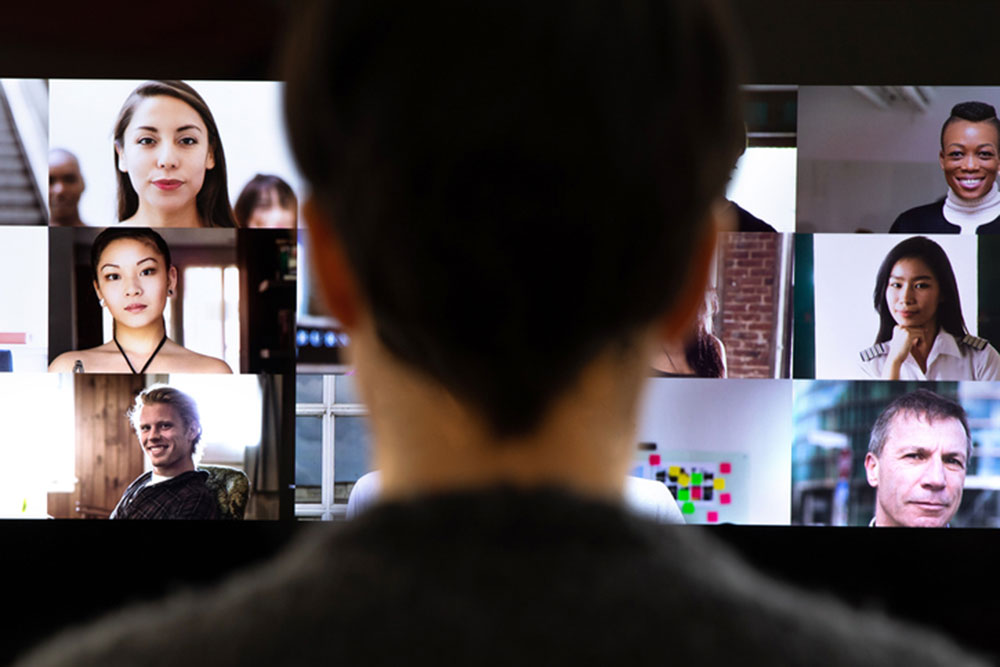
iStock
THE CORONA VIRUS pandemic has been devastating for so many people, because of the virus itself, job loss, hunger and fears about future survival. For anyone able to carry on a semblance of normal work and life from home, the difficulties can be less serious but still challenging.
Zoom— and other face-to-face online meeting options—create problems worth paying attention to as more activities connected with work but also with doctors’ visits, pain management and real estate are expected to go online in the future.
Group zooms create an experience that London-based designer P.L. compares to an AA meeting: everyone else has to maintain a carefully nonjudgmental expression as each person takes their turn.
Even for a party zoom, the full attention of all participants—with each face filling its gallery-view box—makes each person feel as if their turn to weigh in demands more thought, planning and even formal delivery than an in-person group. The result can be Zoom fatigue.
Being on a video call makes our brains work harder to process nonverbal cues like facial expressions and the tone and pitch of the voice, Gianpiero Petriglieri, associate professor at the international business school INSEAD, told the BBC. “Our minds are together when our bodies feel we’re not”— causing dissonance, which is exhausting.
Knowing that you are on camera makes you feel social pressure to perform, and “being performative is nerve-wracking,” says Petriglieri. Also, silences on video calls make people uncomfortable: studies have found that video silences negatively affect others’ view of the speaker.
When prolonged eye contact is the strongest facial cue readily available, “it can feel threatening or overly intimate if held too long.” writes Julia Sklar on National Geographic.
Sklar compares the continuous partial attention on lots of faces required with Zoom to trying to cook and read at the same time. By challenging “the brain’s central vision, forcing it to decode so many people at once…no one comes through meaningfully, not even the speaker.”
In contrast to phone conversations that deliver on a small promise of conveying only a voice, Zoom can overwhelm the brain with “unfamiliar excess stimuli while searching for non-verbal cues it can’t find” — which can be frustrating and lead to Zoom gloom.
New York analyst Cynthia Chalker told The New Yorker she compares doing Zoom therapy to “interviewing kidnap victims or hostages…there’s something about seeing anxiety not in person that’s very strong and moving.”
When connectivity issues cause the video to move jerkily or the audio to break apart into incomprehensible noise, people must make additional efforts to piece together what they are hearing and seeing. Weak internet signals can produce cybersickness, most commonly among virtual reality users.
“With motion sickness you feel ill because you feel movement in your muscles and your inner ear but don’t see it,” according to Lumes, makers of blue-light blocking lenses for computer users. “With digital sickness it’s the opposite. You see movement on the screen but you don’t feel it.”
Once motion sickness sets in, it can last hours, can be both distracting and unpleasant, and can make doing anything else online more difficult. “Videos, animated graphics or even just scrolling through your Instagram feed can all contribute to the effect…can be especially disorientating for people who are already prone to motion sickness,” writes Lumes. Some 50 to 80% of people are affected by nausea from computer screens.
“It’s a natural response to an unnatural environment,” Cyriel Diels, cognitive psychologist at England’s Coventry University, told Lumes. Diels’s advice, which applies to an array of Zoom-related difficulties but especially to those prone to nausea, is to stare at a fixed point when possible to help remind the brain that you are stationary.
Follow the 20-20-20 rule: look at something 20 feet away for 20 seconds, every 20 minutes. Alternatively, take yourself much farther away than 20 feet, not just to rest your eyes but because walking and taking deeper breaths can be a relief from “screen apnea” — the tendency to take shallow breaths when using a screen.
Or simply decide to show up “in voice only,” on the phone. “When we’re not chained into posing as a ‘living headshot,’ we can move around…sit outside in the sunshine,” writes Suzanne Degges-White. Also, rather than doing “double-screen duty” when taking notes on a split screen, write them on paper by hand — which has been shown to increase retention in the classroom.
Try to make the space where you work feel different— either by doing it in a different room or by changing the lighting, adding music, using a different coffee cup, or anything to create a boundary between work and the rest of your life.
According to Petriglieri, “the self-complexity theory posits that individuals have multiple aspects —context-dependent social roles, relationships, activities [and] when these are reduced, we become more vulnerable to negative feelings.”
When Zooming becomes too exhausting, a different suggestion is to “go old-school,” says Petriglieri: “Write a letter to someone…tell them you really care about them.”
On the upside, human connections have flourished in new ways with video chatting, according to Quebec researcher Claude Normand. We can “maintain long-distance relationships…and foster some sense of togetherness during a pandemic.” His suggestion, besides turning off the camera: if the meeting can be done by phone, try walking at the same time. “Walking meetings…improve creativity and probably reduce stress as well.”

Very useful information, Zoom meetings can be exhausting. Thanks, Mary.
There are so many good tips in this article…. I’m going to try to follow the 20-20-20 rule as I find Zoom gatherings a bit too intense for me. Thank you, Mary.
I really liked Mary’s article today, but I think it would have been better if MyLittleBird either posted nothing or a black square today. Just wanted to pass on my feelings about it.